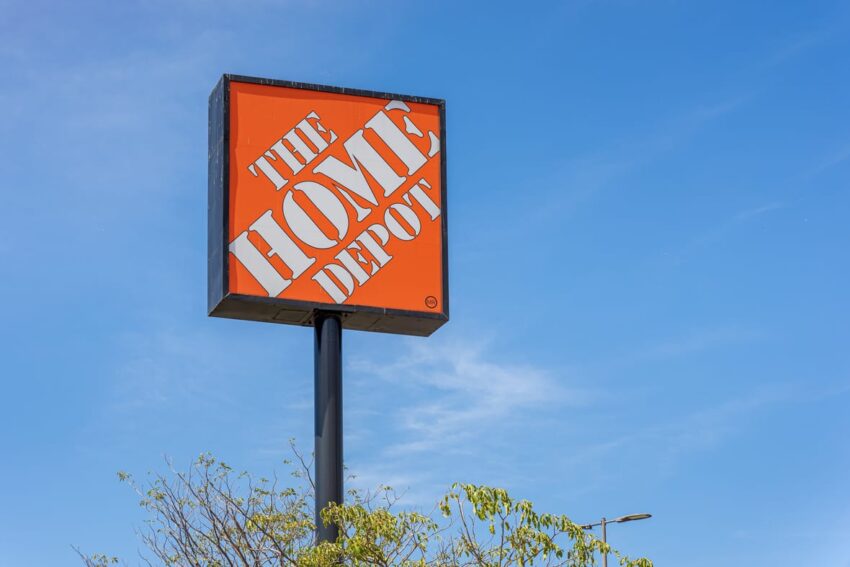Home Depot has announced that some of its prices will be rising because of tariff-related costs, with an executive describing the increases as “modest” and affecting only a limited number of product categories.
America’s largest home improvement retailer reported second-quarter results on Aug. 19, posting sales of $45.3 billion, up nearly 5 percent from a year earlier. Comparable U.S. sales rose 1.4 percent, while earnings came in at $4.6 billion, essentially flat compared to the same period last year.
The quarter marked a continuation of the trend Home Depot saw in the first quarter, when sales were $39.9 billion, up more than 9 percent from a year earlier but with earnings under modest pressure. In both quarters, management highlighted signs of improving market share.
Following the release, Chief Financial Officer Richard McPhail told The Wall Street Journal that the company will end up passing on at least some of the higher costs from the U.S. tariffs on foreign imports.
“For some imported goods, tariff rates are significantly higher today than they were at this time last quarter,” McPhail said. “So as you would expect, there will be modest price movement in some categories, but it won’t be broad-based.”
Three months ago, on the company’s first-quarter earnings call, executives struck a similar note when asked about tariff impacts. Billy Bastek, executive vice president of merchandising, said Home Depot intended to “generally maintain pricing” across its portfolio, pointing to its diversified supply chains and productivity initiatives as buffers.
“We don’t see broad-based price increases for our customers at all going forward,” Bastek said at the time, predicting “limited impact” from tariffs, in part due to plans to rely on the “tremendous flexibility” of its supply chains to switch out line items hit by higher levy costs.
Bastek added that less than half of the company’s inventory comes from outside the United States and that no foreign country supplies more than 10 percent of its goods.
McPhail’s more recent comments are broadly consistent with that stance—acknowledging some targeted price increases but rejecting the notion of sweeping hikes.
Meanwhile, President Donald Trump’s tariff policies remain a central backdrop for the industry. The administration has set a 10 percent baseline levy on nearly all imports, with some duties reaching as high as 40 percent on certain trading partners.
Treasury Secretary Scott Bessent has projected that tariff revenues could hit $300 billion by year’s end. Collections in July alone topped $28 billion, following a record $27 billion in June, and have already surpassed $156 billion for the fiscal year, per the latest Daily Treasury Statement.
Economists differ on who ultimately bears the burden of tariffs. Goldman Sachs recently estimated that U.S. consumers have so far absorbed about one-fifth of the costs of the duties and said that their share could rise by year’s end.
The Trump administration has said that companies and foreign exporters will continue to carry most of it. So far, inflation data have offered considerable support to that view. The headline consumer price index—a common measure of inflation—held steady at 2.7 percent in July.
White House press secretary Karoline Leavitt said the report showed that tariffs are not fueling runaway inflation.
“Today’s CPI report revealed that inflation beat market expectations once again and remains stable, underscoring President Trump’s commitment to lower costs for American families and businesses,” Leavitt said in an Aug. 12 statement.
“The Panicans continue to be proven wrong by the data–President Trump’s tariffs are raking in billions of dollars, small business optimism is at a five-month high, and real wages are rising.”
Story continues below advertisement
She noted that inflation has averaged 1.9 percent since Trump took office, with energy prices down year-over-year and staples such as eggs 20 percent cheaper since January.
In another positive sign, consumer spending rose by a solid 0.5 percent in July, following a 0.9 percent rise in June, indicating that consumers continued to open their wallets and helped power the economy.
At the same time, the number of weekly unemployment filings fell this past week, suggesting businesses are reluctant to lay off workers, despite some signs of a cooling labor market with slower hiring.
The post Home Depot Says to Expect ‘Modest’ Price Hikes Due to Tariffs appeared first on The Political Insider.
Click this link for the original source of this article.
Author: The Epoch Times
This content is courtesy of, and owned and copyrighted by, http://www.thepoliticalinsider.com and its author. This content is made available by use of the public RSS feed offered by the host site and is used for educational purposes only. If you are the author or represent the host site and would like this content removed now and in the future, please contact USSANews.com using the email address in the Contact page found in the website menu.





